牛津译林版(2019)必修 第三册 Unit 2 Natural disasters Reading 课件(86张PPT)
文档属性
| 名称 | 牛津译林版(2019)必修 第三册 Unit 2 Natural disasters Reading 课件(86张PPT) | 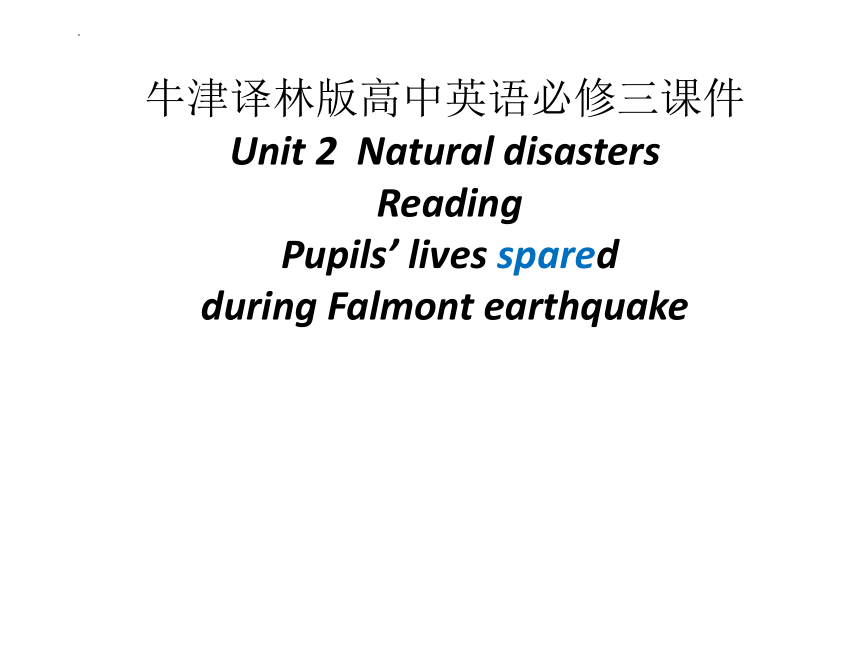 | |
| 格式 | pptx | ||
| 文件大小 | 334.6KB | ||
| 资源类型 | 教案 | ||
| 版本资源 | 牛津译林版(2019) | ||
| 科目 | 英语 | ||
| 更新时间 | 2023-08-25 18:20:14 | ||
图片预览


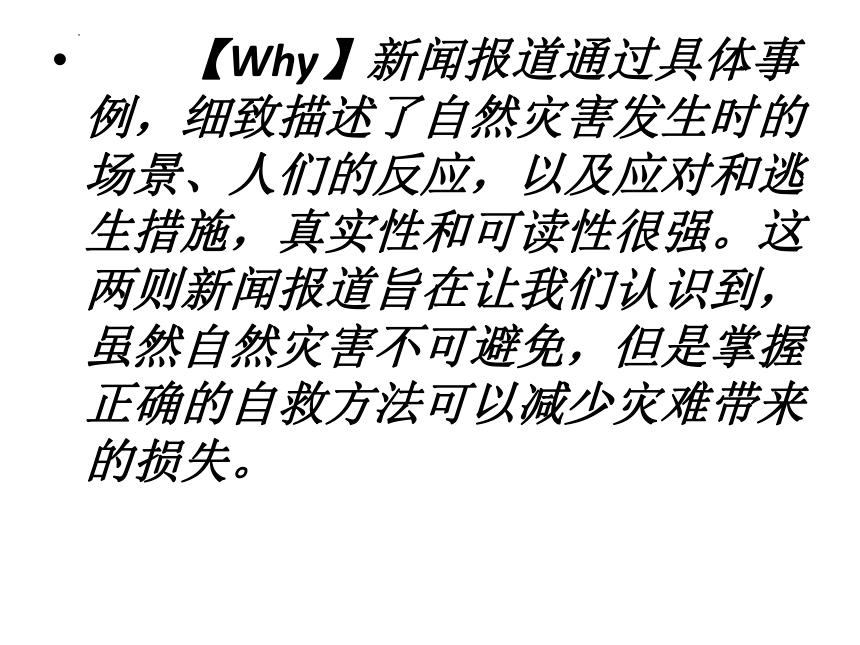
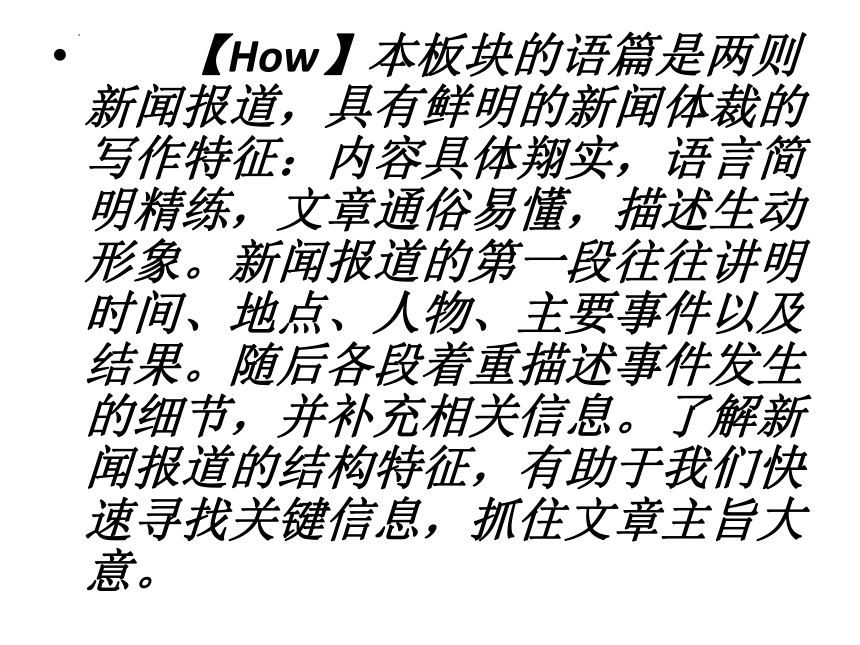
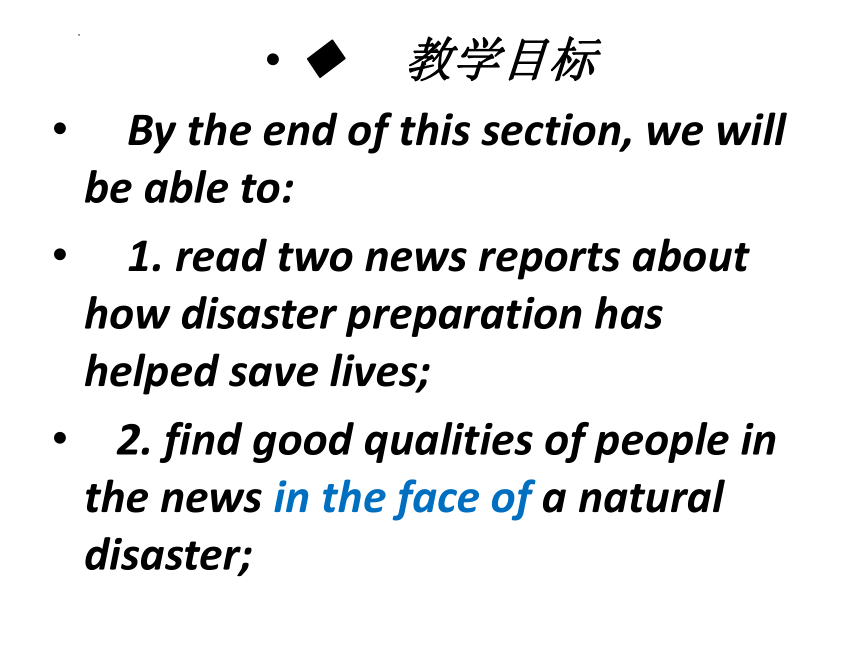
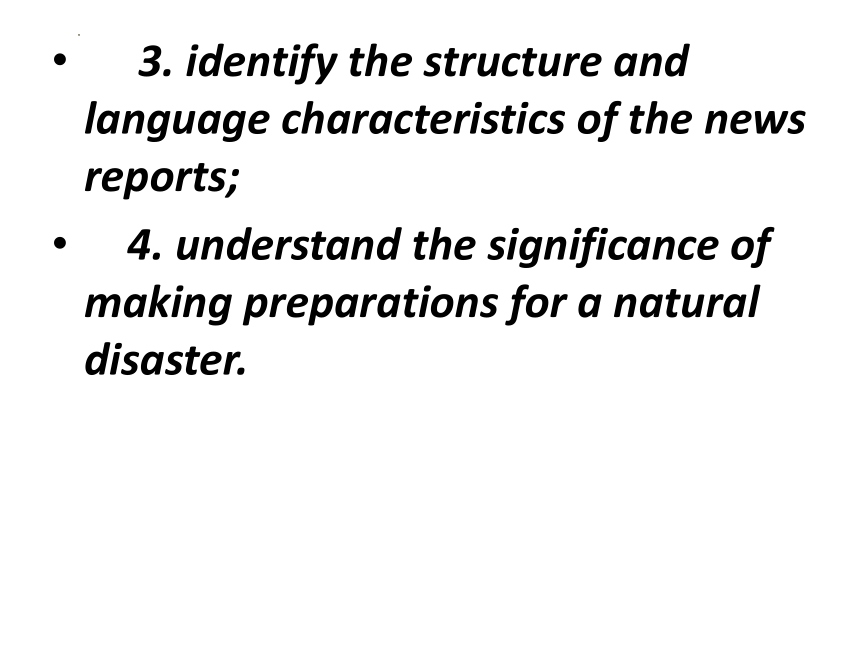
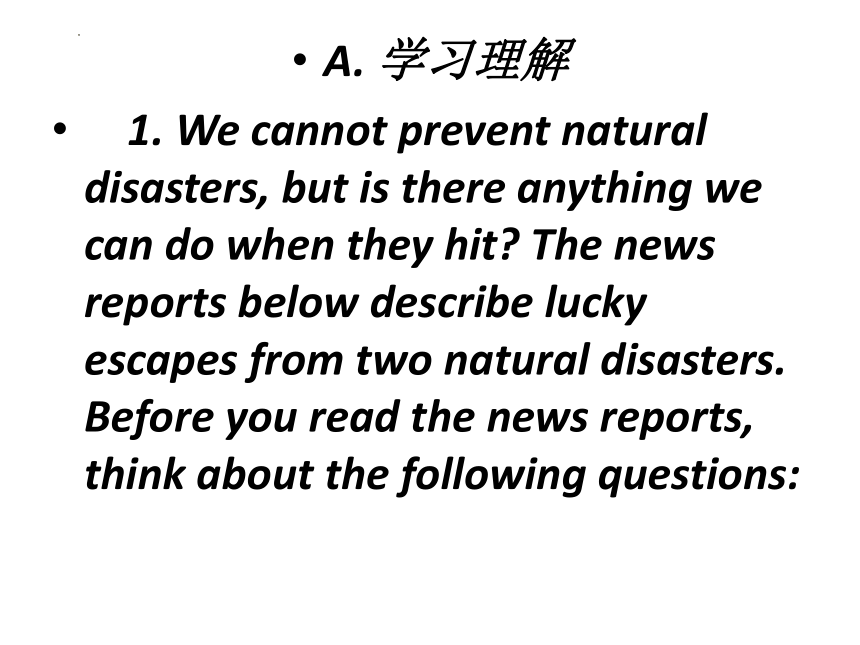
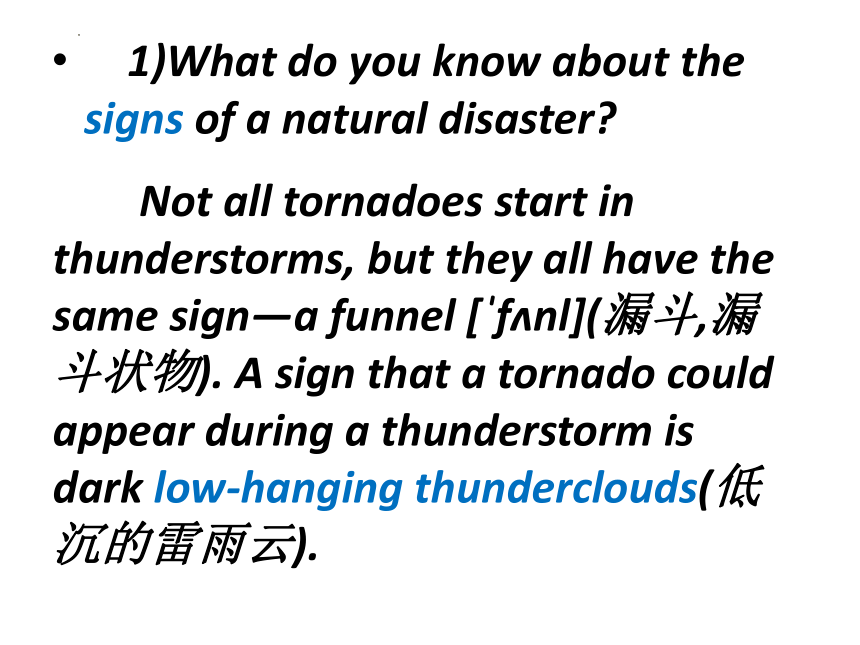
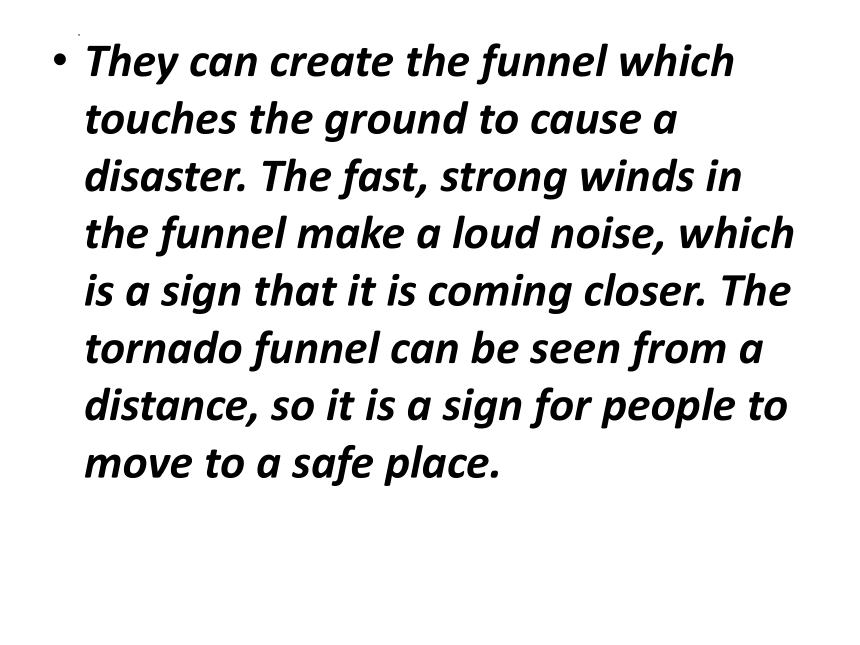
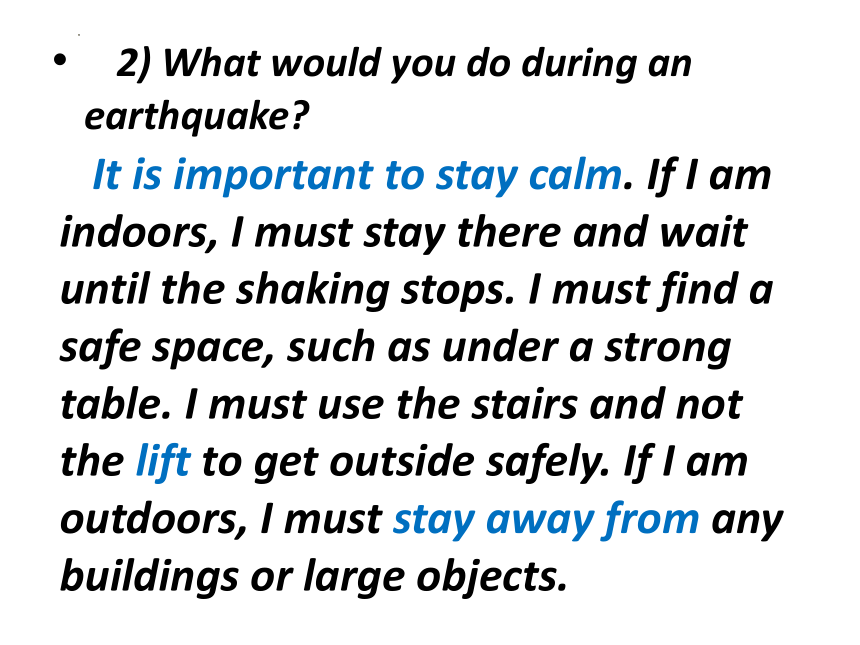
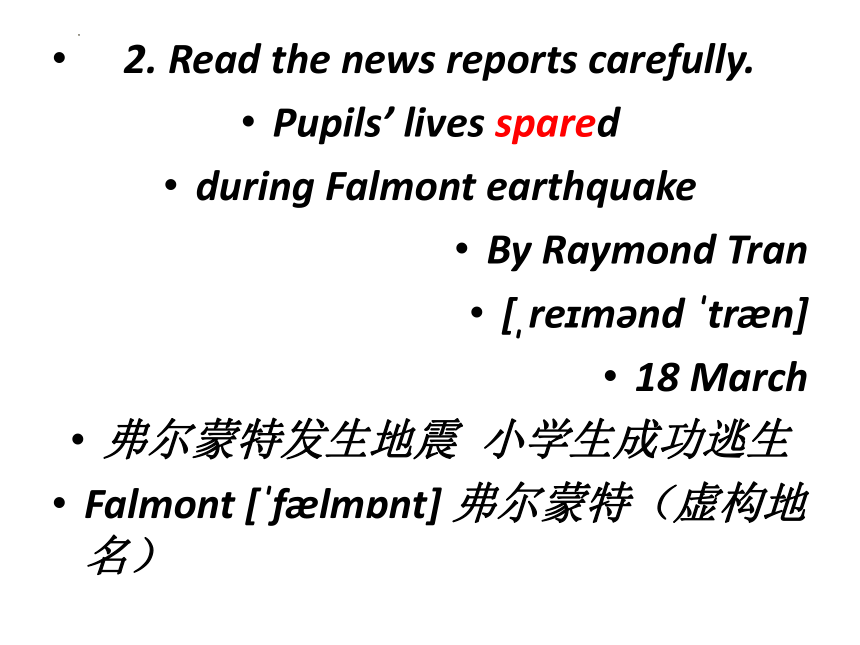
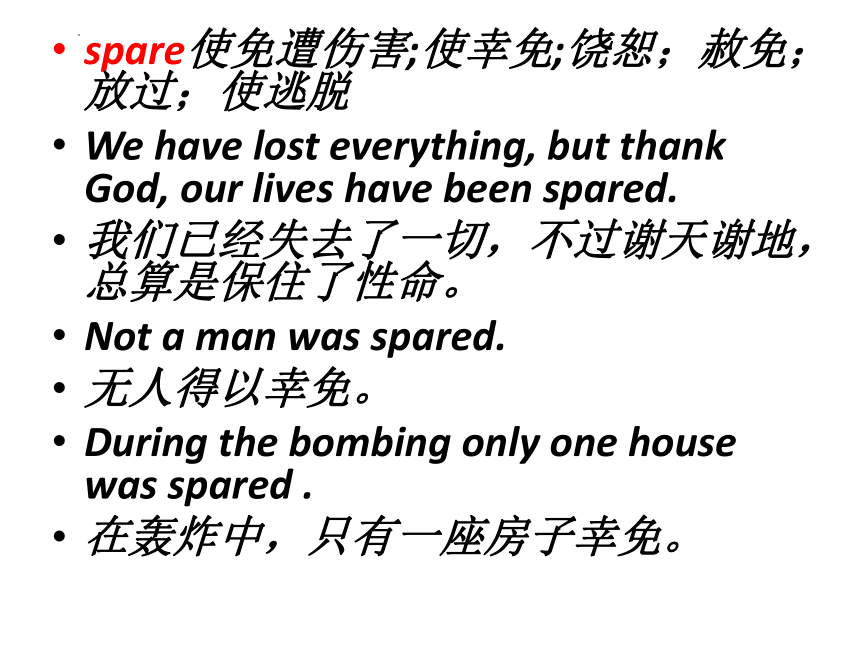
文档简介
(共86张PPT)
牛津译林版高中英语必修三课件
Unit 2 Natural disasters
Reading
Pupils’ lives spared
during Falmont earthquake
◆ 内容分析
【What】本板块主题是“灾难逃生”,语篇是两则新闻报道,分别介绍了地震和海啸发生时人们正确应对从而得以逃生的故事。第一则新闻报道讲述了地震发生时,校长沉着冷静地指挥学生成功自救的事,强调了平时地震安全演练的重要性。第二则新闻报道讲述了在海滩上,一个女孩利用所学的有关海啸的知识成功挽救百余人生命的事。
【Why】新闻报道通过具体事例,细致描述了自然灾害发生时的场景、人们的反应,以及应对和逃生措施,真实性和可读性很强。这两则新闻报道旨在让我们认识到,虽然自然灾害不可避免,但是掌握正确的自救方法可以减少灾难带来的损失。
【How】本板块的语篇是两则新闻报道,具有鲜明的新闻体裁的写作特征:内容具体翔实,语言简明精练,文章通俗易懂,描述生动形象。新闻报道的第一段往往讲明时间、地点、人物、主要事件以及结果。随后各段着重描述事件发生的细节,并补充相关信息。了解新闻报道的结构特征,有助于我们快速寻找关键信息,抓住文章主旨大意。
◆ 教学目标
By the end of this section, we will be able to:
1. read two news reports about how disaster preparation has helped save lives;
2. find good qualities of people in the news in the face of a natural disaster;
3. identify the structure and language characteristics of the news reports;
4. understand the significance of making preparations for a natural disaster.
A. 学习理解
1. We cannot prevent natural disasters, but is there anything we can do when they hit The news reports below describe lucky escapes from two natural disasters. Before you read the news reports, think about the following questions:
1)What do you know about the signs of a natural disaster
Not all tornadoes start in thunderstorms, but they all have the same sign—a funnel [ f nl](漏斗,漏斗状物). A sign that a tornado could appear during a thunderstorm is dark low-hanging thunderclouds(低沉的雷雨云).
They can create the funnel which touches the ground to cause a disaster. The fast, strong winds in the funnel make a loud noise, which is a sign that it is coming closer. The tornado funnel can be seen from a distance, so it is a sign for people to move to a safe place.
2) What would you do during an earthquake
It is important to stay calm. If I am indoors, I must stay there and wait until the shaking stops. I must find a safe space, such as under a strong table. I must use the stairs and not the lift to get outside safely. If I am outdoors, I must stay away from any buildings or large objects.
2. Read the news reports carefully.
Pupils’ lives spared
during Falmont earthquake
By Raymond Tran
[ re m nd tr n]
18 March
弗尔蒙特发生地震 小学生成功逃生
Falmont [ f lm nt] 弗尔蒙特(虚构地名)
spare使免遭伤害;使幸免;饶恕;赦免;放过;使逃脱
We have lost everything, but thank God, our lives have been spared.
我们已经失去了一切,不过谢天谢地,总算是保住了性命。
Not a man was spared.
无人得以幸免。
During the bombing only one house was spared .
在轰炸中,只有一座房子幸免。
FALMONT—On 17 March, 476 students and 36 teachers at Falmont Primary School escaped an earthquake that hit the county at 2:27 p.m. Only 5 students suffered slight injuries, despite the current figures of 7 killed and over 200 injured in the disaster area at large (整个;全部;总地;一般地).
Alice Brown, head teacher(校长) at Falmont Primary School, was teaching when the floor began to shake. Her students’ reaction was quick and correct—they moved under their desks, head first, and held on to the legs of the desks.
她的学生们反应迅速 、 正确——他们头朝里,爬到课桌下面,并紧紧抓住桌腿。
head first
A. 头在前;头朝下
He fell head first down the stairs.
他倒栽葱摔下楼梯。
B. 未经深思;轻率;鲁莽
She got divorced and rushed head first into another marriage.
她离婚后又仓促再婚了。
hold on (to sth/sb) | hold onto sth/sb[无被动态] 抓紧;不放开
Hold on and don't let go until I say so.握紧,等我让你松手时再松开。
He held onto the back of the chair to stop himself from falling.
他扶住椅子后背,以免摔倒。
hold on to sth | hold onto sth
A. 保住(优势);不送(或不卖)某物
She took an early lead in the race and held onto it for nine laps.赛跑一开始她便冲到了前面,并九圈一直保持领先。
B. (替别人或更长时间地)保存某物
I'll hold onto your mail for you until you get back.
你回来之前我将一直替你保管邮件。
hold on
A. (informal) 等着;停住,=wait
Hold on a minute while I get my breath back.稍等一下,让我喘口气。
B. (在困境或危险中)坚持住,挺住
They managed to hold on until help arrived.他们勉强坚持到救援到来。
C. (informal) (电话用语)别挂断,等一下
At the same time, Miss Brown quickly opened the classroom door, in case it became damaged during the shaking and could not open. △ There were loud crashes of glass breaking and things falling to the ground, but the students remained still and waited calmly and quietly.
尽管玻璃破碎和物体落地发出阵阵巨响,但是学生们仍然一动不动,沉着安静地等待着。
动名词的复合结构
构成:
名词普通格/名词所有格+v ing
形容词性物主代词/宾格代词+v in
用法:通常作句子的主语、宾语。
注意:
若该结构作主语置于句首时,只能用名词所有格或物主代词。
这种结构的否定式仍是在v ing前加not。
It's no use your trying to cheat me.
Tom's having seen them did not surprise us.
Your going there will help a lot.
Do you mind me/my opening the door?
I have often heard of him/his working hard.
Mary's not passing the exam made her father very angry.
The moment the shaking stopped, Miss Brown sensed it was the best time for the class to make their escape. She signalled to her students to exit the classroom in an orderly line covering their heads with their hands. Within one minute and twenty seconds, the whole class went down the stairs and rushed to the playground.
the moment/ minute/instant (that)… : as soon as… 一…就…
I want to see him the moment he arrives.希望他一到我就见到他。
signal (to sb) 发信号;发暗号;示意
He signalled to the waiter for the bill.他示意服务员结账。
He signalled to us to join him.
他示意要我们去他那儿。
She signalled him to follow.
她示意他跟她走。
“We practise earthquake safety procedures(安全事务 处理程序) twice a year,” said Miss Brown, “so the kids were calm enough to protect themselves during the earthquake.”
Girl saves 100 from tsunami
By Jessie Cable
[ d esi ke bl]
21 December
save sb/sth[from (doing) sth] 救;救助;挽救;拯救
She saved a little girl from falling into the water.
她救下一个眼看要落入水中的小女孩。
NEWDALE[ nju de l] —On 20 December, a series of huge waves caused by an undersea earthquake raced across the ocean near Goldshore and left thousands dead. Goldshore Beach was the only local beach to survive(幸存;幸免于难;艰难度过) the disaster without any loss of life.
金海岸海滩是当地唯一一个在此次灾难中没有任何人员损失的海滩。
race
A.~ + 副词或介词短语] (使)快速移动,快速运转
He raced up the stairs.
他飞快地冲上楼去。
The days seemed to race past.
日子似乎很快就过去了。
The injured man was raced to the hospital.受伤者被迅速送往医院。
She raced her car through the narrow streets of the town.她开着车在小镇狭窄的街道上飞快地穿行。
I had to race home for my homework.
我不得不飞奔回家拿家庭作业。
B.(因为害怕、兴奋等)急速跳动,快速转动
My mind raced as I tried to work out what was happening.我拼命地转动脑筋,想要搞清楚发生了什么事儿。
She took a deep breath to calm her racing pulse. 她深深地吸了口气,想使急速跳动的脉搏平静下来。
I made sure I sounded calm but my mind was racing. 我确保自己听上去很镇定,但脑筋却飞快地转着。
A 10-year-old girl, Sabrina Andron [s bri n ndr n], helped around 100 people escape danger with her knowledge of tsunamis.
The day began like any other on Goldshore Beach. People were walking, running or simply sitting on the sandy beach, enjoying the warm sea air and the soft wind that brushed their hair.
Sabrina was one of the happy tourists until she noticed something odd. “The water was like the bubbles on the top of a beer,” she later explained. “It wasn’t calm and it wasn’t going in and then out. It was just coming in and in and in.”
“海水像啤酒表面的泡沫一样,”她后来解释说,“不平静,也没有潮来潮去。海水只是一个劲儿地涌过来,涌过来,再涌过来。”
go out
A. 出门参加社交活动;外出交际;外出娱乐
She goes out a lot.
她经常外出参加社交活动。
B. 退潮;落潮,
同义词:ebb 反义词:come in
C. 送出;发出;派出
Have the invitations gone out yet
请柬发出去了吗?
D. (British English) (广播或电视节目)播放,播出
E. (新闻或消息)发布,公布,发表
Word went out that the director had resigned.
局长已经辞职的消息公开了。
F. (火或灯光)熄灭
come in
A. (潮水)上涨;涨潮
B. (赛跑等比赛中)取得(名次)
My horse came in last.
我的马跑了最后一名。
C. 变时髦;时兴;流行
Long hair for men came in in the sixties.
男子留长发在60年代流行开来。
反义词:go out
D. 可提供;可利用
We're still waiting for copies of the book to come in.我们仍然在等这本书进货。
E. 在…中起作用;参与
I understand the plan perfectly, but I can't see where I come in.我完全了解这项计划,可是不明白我能起什么作用。
F. 到达;被收到
The train is coming in now.
火车现在进站。
Sabrina had just learnt about tsunamis in a Geography lesson. △It immediately occurred to her that these were signs of an approaching tsunami.
Sabrina was frightened, but she soon kept her head. She warned her parents of the danger, though at first they just thought she was joking.
sign (of sth) | sign (that…) 迹象;征兆;预兆,=indication
There is no sign of John anywhere.
哪儿都没有约翰的影子。
Call the police at the first sign of trouble.一有闹事的苗头就叫警察。
The gloomy weather shows no sign of improving.
阴沉的天气没有丝毫转晴的迹象。
warn (sb) (of sth) | warn (sb) (about/against sb/sth) 提醒注意(可能发生的事);使警惕
If you're thinking of getting a dog, be warned ─they take a lot of time and money.如果你想养条狗,有话说在前头,那可既费时间又费钱。
He warned us against pickpockets.
他提醒我们要提防小偷。
[动词 + 名词短语 + that从句]
She was warned that if she did it again she would lose her job.她被警告说如果她再这样做就会丢掉工作。
[动词 + 名词短语 + wh-从句]
I had been warned what to expect.
有人事先告诉过我要出什么事。
[单独使用的动词]
Police have warned of possible delays.
警方已经通知可能会延期。
However, Sabrina was certain that a terrible disaster was on its way and kept asking her parents to talk to a safety officer[ (公司或组织的)安全员,安全负责人]. To her great relief, the officer immediately realized the coming danger. The beach was rapidly cleared of people, just before the huge waves crashed into the coast.
使她大为宽慰的是,安全员立即意识到危险即将来临。就在巨浪拍岸的前一刻,海滩上的人迅速疏散一空。
on your/the/its way
A. 即将去(或来);就要去(或来)
I'd better be on my way (= I must leave) soon. 我最好还是快点儿走。
The letter should be on its way to you.
那封信该在路上了。
B. 在路上;在行进中
He stopped for breakfast on the way.
他中途停下吃早点。
She grabbed her camera and bag on her way out.
她出门时一把抓起照相机和提包。
C. (婴儿) 尚未出生的
They've got three kids and one on the way. 他们有三个孩子,还有一个尚未出生。
to one’s relief “使某人宽慰的是”。
To my great relief, the doctor said that it was just the flu.使我大为宽慰的是,医生说那只是流感。
I breathed a sigh of relief.
我如释重负地松了口气。
The news will come as a great relief to the French authorities...
这个消息会让法国当局大大松一口气。
clear A (of B) | clear B (from/off A) 移走,搬走,清除(不需要的东西);清理
I cleared my desk of papers.
我清理好了写字台上的文件。
Clear all those papers off the desk.
把桌子上所有那些文件都拿走。
The streets had been cleared of snow.
街道上的积雪已被清除干净。
3. Revise the structure of the news report.
We have learnt the structure of the news report. “A news report usually starts with a lead(线索;头绪). It gives the most important information about an event. Then the following paragraphs give more detailed information about the event. Some news reports go on to provide background or supporting information.”
Please fill in the following table after reading the two news reports according to the structure of the news report.
News report 1
The lead Para.1: (1)_______________________________
________________________________________
________________________________________
________________________________________
More detailed information about the event Paras. (2) __________: (3)_______________
________________________________________
________________________________________
Background or supporting information Para. (4) : ______(5)_______________________
________________________________________
FALMONT—On 17 March, 476
students and 36 teachers at Falmont Primary School escaped an earthquake that hit the county at 2:27 p.m.
2 and 3
The process of
escaping successfully from the earthquake
4
The reason for their
calmness in the earthquake
News report 1
The lead Para.1: A 10-year-old girl, Sabrina Andron, helped around 100 people escape danger with her knowledge of tsunamis.
More detailed information about the event Paras. (6) : ________(7)______________
__________________________________
Background or supporting information Not mentioned.
2 and 3
How Sabrina
saved so many lives
4. Finish A1 on page 18.
A1. Read the news reports and complete the table below.
17 March
saved
themselves from an earthquake
The school’s safety procedures taught students and teachers how to protect themselves
Goldshore Beach
saved around
100 people on the beach from a terrible tsunami
The girl warned of an approaching tsunami, and the beach was cleared just in time
5. Finish A2 on page 18.
A2. Read the news reports again carefully and answer the following questions.
1)How many deaths and injuries did the earthquake cause in Falmont
It caused 7 deaths and over 200 injuries.
2) Why did Miss Brown quickly open the classroom door
3) What did Sabrina notice about the sea water
She did this just in case it became damaged during the shaking and could not open.
She noticed that the water was like the bubbles on the top of a beer and that it was just coming in and in and in.
4) What was her parents’ first reaction when Sabrina warned them of the approaching tsunami
B. 应用实践
1. Read the first news report again and finish the table below.
They thought she was joking.
What happened Miss Brown’s reaction Students’ reaction
The floor began to shake. She quickly opened the classroom door. They moved under their desks, head first, and held on to the legs of the desks.
(1)__________________________
____________________________
Loud crashes of glass breaking and things falling to the ground were heard. Shaking stopped. (2)________________ __________________ __________________ __________________ __________________ (3)_______________________
_________________________
_________________________
A roll call confirmed that all were safe and sound (4)___________________________________________ _____________________________________________ They remained still and waited calmly and quietly.
She signalled to
her students to exit the classroom in an orderly line covering their heads with their hands.
The whole class went down the stairs and rushed to the playground within one
minute and twenty seconds.
They felt relaxed, laughing, crying and hugging each other.
2. Read the second news report again and answer the following question.
How did Sabrina’s emotions change during the whole event
At first, she was happily enjoying herself on the beach. She must have felt shocked when she realized that a tsunami was approaching. But soon she kept calm and asked for help. When the officer realized the coming danger, she felt relieved.
3. Answer the first two questions of A3 on page 18.
1) What personalities did Miss Brown and Sabrina show in the disasters Use details from the news reports to support your opinion.
Miss Brown was thoughtful(考虑周到的) when she remembered to open the classroom door during the earthquake. She was calm enough to sense the best time to escape. Sabrina was watchful(警觉的;警惕的) when she noticed the strange condition of the sea. She was quick-thinking, took immediate action and determined to warn her parents of the danger.
(2) What can you learn from these two news reports
We cannot prevent natural disasters but we can arm ourselves with(武装;装备;备战) knowledge. Loss of life can be limited through disaster preparation. We need to respond to these situations calmly and quickly.
4. Find the direct speech in the news reports and analyse its functions.
Direct speech in the news reports:
“We practise earthquake safety procedures twice a year,” said Miss Brown, “so the kids were calm enough to protect themselves during the earthquake.” (page 16,lines 19 — 22)
“The water was like the bubbles on the top of a beer,” she later explained. “It wasn’t calm and it wasn’t going in and then out. It was just coming in and in and in.” (page 17, lines 9 — 11)
Direct speech gives the exact words of a person in the news report, which helps personalize the events and convince the reader that the report is real.
5. Finish B3 on page 19.
B3. The news reports describe scenes using different senses. Find the sentences about sights and sounds in the news reports and describe the picture below, using at least two senses.
Learn this:
When describing a scene, use sensory information to put the reader in the action [(故事、戏剧等中的)情节]. How do things look, sound, feel, smell and taste Such descriptive [d skr pt v] details allow the reader to be transported into the scene.
Sentences using different senses:
There were loud crashes of glass breaking and things falling to the ground, but the students remained still and waited calmly and quietly.
People were walking, running or simply sitting on the sandy beach, enjoying the warm sea air and the soft wind that brushed their hair.
The dancing flames of the forest fire jumped from one tree to the next. The crackling [(一连串的)爆裂声,噼啪声] of burning trees reminded me of sitting around a campfire. Staring at the bright yellow-orange flames made me sleepy, but that soon changed when I realized I couldn’t breathe.
The strong smell of smoke from the burning landscape irritated [ 刺激(皮肤或身体部位)] my nose as it forced its way(挤进;闯出;强行通过) into my lungs; I decided to get away before it was too late.
6. Finish B1 on page 19.
B1. The passage below is about typhoon safety plete the passage with the correct forms of the words and phrases in the box below.
reaction procedure crash
keep one’s head confirm
exit safe and sound at large
A typhoon is a destructive storm that occurs in the north-west Pacific Ocean. Typhoons are quite common in south-east Asian countries. In 2013, when Super Typhoon Haiyan hit the Philippines [ f l 'pi:nz] and neighbouring countries, huge waves (1) _______ into the coasts, causing serious damage. The disaster killed thousands of people in the area (2) _______.
crashed
at large
Although there is no way to prevent a typhoon, you can get prepared for it. In order to protect yourself from a typhoon, follow the proper safety (3) ___________.The correct and quick (4) ________ can make the difference between life and death. If a typhoon is approaching, close and lock all windows and doors, and tie down large outdoor objects so that they do not blow away.
procedures
reaction
During a typhoon, you should do your best to (5) ______________. It is also important that you stay inside. If you have to go outside, always (6) ____ using the stairs. When you are out, stay away from trees, large signs(招牌;标牌;指示牌) and light poles. Remember to inform yourself of what is going on.
keep your head
exit
Pay attention to news updates(最新消息;快讯;速递 ) (7) _________ whether the danger is gone. These tips will help keep you (8) ______________ in the face of a typhoon.
to confirm
safe and sound
7. Finish B2 on page 19.
B2. The news reports use “crash” and “escape” as different parts of speech. Find the sentences containing these words and make sentences using each of them. The first pair of sentences are given.
Tip: Learning words used as different parts of speech(词类;词性)
Many English words can be used as more than one part of speech. For example, water can be used as a noun (drinking water) and a verb (water the flowers). Pay attention to these words and their collocations [k l 'ke nz](搭配)—remembering how they are used helps you master these words.
There were loud crashes of glass breaking and things falling to the ground, but the students remained still and waited calmly and quietly.
The beach was rapidly cleared of people, just before the huge waves crashed into the coast.
The airplane crash was caused by unexpected stormy weather. It crashed into the mountains because visibility was very poor.
The first “crash” is a noun and the
second one is a verb.
The sound of the crash was deafening(震耳欲聋的;极喧闹的). Everybody ran outside in terror and saw that an airplane had crashed into the building.
The first “crash” is a noun and the
second one is a verb.
Sentences using “escape”:
1) On 17 March, 476 students and 36 teachers at Falmont Primary School escaped an earthquake that hit the county at 2:27 p.m.
Here “escape” is a verb.
2) The moment the shaking stopped, Miss Brown sensed it was the best time for the class to make their escape.
3) A 10-year-old girl, Sabrina Andron, helped around 100 people escape danger with her knowledge of tsunamis.
Here “escape” is a noun.
Here “escape” is a verb.
The prisoner who escaped the other day was caught. His escape made/grabbed/hit/ the news headlines (成为重要新闻).
The first “escape” is a verb and the second one is a noun.
The family’s escape from the dangerous tornado was reported on the news. Unfortunately, not everyone escaped.
The first “escape” is a noun and the second one is a verb.
C.迁移创新
1. List some warning signs of natural disasters you know of.
If the sky turns a sickly[ (颜色、灯光等)暗淡的,苍白的,微弱的] shade of green, it is a fairly common indicator(指示信号;标志;迹象) for exceptionally(罕见,特别,非常) severe thunderstorms.
Cats, dogs, and other small creatures are known to get anxious and run away moments before an earthquake strikes. These animals are able to sense the preliminary [pr l m n ri] (预备性的;初步的;开始的) waves signalling an earthquake ahead of the more destructive seismic [ sa zm k] (地震的;地震引起的) waves, which humans can’t detect.
Volcanic earthquakes may be smaller than major quakes, but volcanologists [ v lk n' l d st](火山学家) go on high alert when a volcano starts to shake. This is normally a reliable sign that the volcano is going to erupt within the next few weeks, prompting(促使;导致;激起;提示) evacuations [ v kju: e nz] [(把人从危险的地方)疏散,转移,撤离] of nearby communities.
Developing cracks(裂纹;裂缝) on the ground indicates a landslide in the making [在生产(或形成)过程中]. Even strong surfaces like pavements [(硬化)路面] can suddenly crack(破裂;裂开;断裂) before a landslide brings them down.
If it suddenly gets very cold outside on a grey[ (天空或天气) 昏暗的;阴沉的], rainy day, there is a high likelihood(可能;可能性) that it is about to start hailing(下冰雹).
2. Answer the third question of A3 on page 18.
What can be done to prepare for a natural disaster
In the event of (如果…发生;万一;倘若) a natural disaster, the following things can be helpful: better warning systems, awareness-centred education programmes(以提高认识为中心的教育项目), supply kits(供应包), plans to get people out of the danger area, and shelter construction.
牛津译林版高中英语必修三课件
Unit 2 Natural disasters
Reading
Pupils’ lives spared
during Falmont earthquake
◆ 内容分析
【What】本板块主题是“灾难逃生”,语篇是两则新闻报道,分别介绍了地震和海啸发生时人们正确应对从而得以逃生的故事。第一则新闻报道讲述了地震发生时,校长沉着冷静地指挥学生成功自救的事,强调了平时地震安全演练的重要性。第二则新闻报道讲述了在海滩上,一个女孩利用所学的有关海啸的知识成功挽救百余人生命的事。
【Why】新闻报道通过具体事例,细致描述了自然灾害发生时的场景、人们的反应,以及应对和逃生措施,真实性和可读性很强。这两则新闻报道旨在让我们认识到,虽然自然灾害不可避免,但是掌握正确的自救方法可以减少灾难带来的损失。
【How】本板块的语篇是两则新闻报道,具有鲜明的新闻体裁的写作特征:内容具体翔实,语言简明精练,文章通俗易懂,描述生动形象。新闻报道的第一段往往讲明时间、地点、人物、主要事件以及结果。随后各段着重描述事件发生的细节,并补充相关信息。了解新闻报道的结构特征,有助于我们快速寻找关键信息,抓住文章主旨大意。
◆ 教学目标
By the end of this section, we will be able to:
1. read two news reports about how disaster preparation has helped save lives;
2. find good qualities of people in the news in the face of a natural disaster;
3. identify the structure and language characteristics of the news reports;
4. understand the significance of making preparations for a natural disaster.
A. 学习理解
1. We cannot prevent natural disasters, but is there anything we can do when they hit The news reports below describe lucky escapes from two natural disasters. Before you read the news reports, think about the following questions:
1)What do you know about the signs of a natural disaster
Not all tornadoes start in thunderstorms, but they all have the same sign—a funnel [ f nl](漏斗,漏斗状物). A sign that a tornado could appear during a thunderstorm is dark low-hanging thunderclouds(低沉的雷雨云).
They can create the funnel which touches the ground to cause a disaster. The fast, strong winds in the funnel make a loud noise, which is a sign that it is coming closer. The tornado funnel can be seen from a distance, so it is a sign for people to move to a safe place.
2) What would you do during an earthquake
It is important to stay calm. If I am indoors, I must stay there and wait until the shaking stops. I must find a safe space, such as under a strong table. I must use the stairs and not the lift to get outside safely. If I am outdoors, I must stay away from any buildings or large objects.
2. Read the news reports carefully.
Pupils’ lives spared
during Falmont earthquake
By Raymond Tran
[ re m nd tr n]
18 March
弗尔蒙特发生地震 小学生成功逃生
Falmont [ f lm nt] 弗尔蒙特(虚构地名)
spare使免遭伤害;使幸免;饶恕;赦免;放过;使逃脱
We have lost everything, but thank God, our lives have been spared.
我们已经失去了一切,不过谢天谢地,总算是保住了性命。
Not a man was spared.
无人得以幸免。
During the bombing only one house was spared .
在轰炸中,只有一座房子幸免。
FALMONT—On 17 March, 476 students and 36 teachers at Falmont Primary School escaped an earthquake that hit the county at 2:27 p.m. Only 5 students suffered slight injuries, despite the current figures of 7 killed and over 200 injured in the disaster area at large (整个;全部;总地;一般地).
Alice Brown, head teacher(校长) at Falmont Primary School, was teaching when the floor began to shake. Her students’ reaction was quick and correct—they moved under their desks, head first, and held on to the legs of the desks.
她的学生们反应迅速 、 正确——他们头朝里,爬到课桌下面,并紧紧抓住桌腿。
head first
A. 头在前;头朝下
He fell head first down the stairs.
他倒栽葱摔下楼梯。
B. 未经深思;轻率;鲁莽
She got divorced and rushed head first into another marriage.
她离婚后又仓促再婚了。
hold on (to sth/sb) | hold onto sth/sb[无被动态] 抓紧;不放开
Hold on and don't let go until I say so.握紧,等我让你松手时再松开。
He held onto the back of the chair to stop himself from falling.
他扶住椅子后背,以免摔倒。
hold on to sth | hold onto sth
A. 保住(优势);不送(或不卖)某物
She took an early lead in the race and held onto it for nine laps.赛跑一开始她便冲到了前面,并九圈一直保持领先。
B. (替别人或更长时间地)保存某物
I'll hold onto your mail for you until you get back.
你回来之前我将一直替你保管邮件。
hold on
A. (informal) 等着;停住,=wait
Hold on a minute while I get my breath back.稍等一下,让我喘口气。
B. (在困境或危险中)坚持住,挺住
They managed to hold on until help arrived.他们勉强坚持到救援到来。
C. (informal) (电话用语)别挂断,等一下
At the same time, Miss Brown quickly opened the classroom door, in case it became damaged during the shaking and could not open. △ There were loud crashes of glass breaking and things falling to the ground, but the students remained still and waited calmly and quietly.
尽管玻璃破碎和物体落地发出阵阵巨响,但是学生们仍然一动不动,沉着安静地等待着。
动名词的复合结构
构成:
名词普通格/名词所有格+v ing
形容词性物主代词/宾格代词+v in
用法:通常作句子的主语、宾语。
注意:
若该结构作主语置于句首时,只能用名词所有格或物主代词。
这种结构的否定式仍是在v ing前加not。
It's no use your trying to cheat me.
Tom's having seen them did not surprise us.
Your going there will help a lot.
Do you mind me/my opening the door?
I have often heard of him/his working hard.
Mary's not passing the exam made her father very angry.
The moment the shaking stopped, Miss Brown sensed it was the best time for the class to make their escape. She signalled to her students to exit the classroom in an orderly line covering their heads with their hands. Within one minute and twenty seconds, the whole class went down the stairs and rushed to the playground.
the moment/ minute/instant (that)… : as soon as… 一…就…
I want to see him the moment he arrives.希望他一到我就见到他。
signal (to sb) 发信号;发暗号;示意
He signalled to the waiter for the bill.他示意服务员结账。
He signalled to us to join him.
他示意要我们去他那儿。
She signalled him to follow.
她示意他跟她走。
“We practise earthquake safety procedures(安全事务 处理程序) twice a year,” said Miss Brown, “so the kids were calm enough to protect themselves during the earthquake.”
Girl saves 100 from tsunami
By Jessie Cable
[ d esi ke bl]
21 December
save sb/sth[from (doing) sth] 救;救助;挽救;拯救
She saved a little girl from falling into the water.
她救下一个眼看要落入水中的小女孩。
NEWDALE[ nju de l] —On 20 December, a series of huge waves caused by an undersea earthquake raced across the ocean near Goldshore and left thousands dead. Goldshore Beach was the only local beach to survive(幸存;幸免于难;艰难度过) the disaster without any loss of life.
金海岸海滩是当地唯一一个在此次灾难中没有任何人员损失的海滩。
race
A.~ + 副词或介词短语] (使)快速移动,快速运转
He raced up the stairs.
他飞快地冲上楼去。
The days seemed to race past.
日子似乎很快就过去了。
The injured man was raced to the hospital.受伤者被迅速送往医院。
She raced her car through the narrow streets of the town.她开着车在小镇狭窄的街道上飞快地穿行。
I had to race home for my homework.
我不得不飞奔回家拿家庭作业。
B.(因为害怕、兴奋等)急速跳动,快速转动
My mind raced as I tried to work out what was happening.我拼命地转动脑筋,想要搞清楚发生了什么事儿。
She took a deep breath to calm her racing pulse. 她深深地吸了口气,想使急速跳动的脉搏平静下来。
I made sure I sounded calm but my mind was racing. 我确保自己听上去很镇定,但脑筋却飞快地转着。
A 10-year-old girl, Sabrina Andron [s bri n ndr n], helped around 100 people escape danger with her knowledge of tsunamis.
The day began like any other on Goldshore Beach. People were walking, running or simply sitting on the sandy beach, enjoying the warm sea air and the soft wind that brushed their hair.
Sabrina was one of the happy tourists until she noticed something odd. “The water was like the bubbles on the top of a beer,” she later explained. “It wasn’t calm and it wasn’t going in and then out. It was just coming in and in and in.”
“海水像啤酒表面的泡沫一样,”她后来解释说,“不平静,也没有潮来潮去。海水只是一个劲儿地涌过来,涌过来,再涌过来。”
go out
A. 出门参加社交活动;外出交际;外出娱乐
She goes out a lot.
她经常外出参加社交活动。
B. 退潮;落潮,
同义词:ebb 反义词:come in
C. 送出;发出;派出
Have the invitations gone out yet
请柬发出去了吗?
D. (British English) (广播或电视节目)播放,播出
E. (新闻或消息)发布,公布,发表
Word went out that the director had resigned.
局长已经辞职的消息公开了。
F. (火或灯光)熄灭
come in
A. (潮水)上涨;涨潮
B. (赛跑等比赛中)取得(名次)
My horse came in last.
我的马跑了最后一名。
C. 变时髦;时兴;流行
Long hair for men came in in the sixties.
男子留长发在60年代流行开来。
反义词:go out
D. 可提供;可利用
We're still waiting for copies of the book to come in.我们仍然在等这本书进货。
E. 在…中起作用;参与
I understand the plan perfectly, but I can't see where I come in.我完全了解这项计划,可是不明白我能起什么作用。
F. 到达;被收到
The train is coming in now.
火车现在进站。
Sabrina had just learnt about tsunamis in a Geography lesson. △It immediately occurred to her that these were signs of an approaching tsunami.
Sabrina was frightened, but she soon kept her head. She warned her parents of the danger, though at first they just thought she was joking.
sign (of sth) | sign (that…) 迹象;征兆;预兆,=indication
There is no sign of John anywhere.
哪儿都没有约翰的影子。
Call the police at the first sign of trouble.一有闹事的苗头就叫警察。
The gloomy weather shows no sign of improving.
阴沉的天气没有丝毫转晴的迹象。
warn (sb) (of sth) | warn (sb) (about/against sb/sth) 提醒注意(可能发生的事);使警惕
If you're thinking of getting a dog, be warned ─they take a lot of time and money.如果你想养条狗,有话说在前头,那可既费时间又费钱。
He warned us against pickpockets.
他提醒我们要提防小偷。
[动词 + 名词短语 + that从句]
She was warned that if she did it again she would lose her job.她被警告说如果她再这样做就会丢掉工作。
[动词 + 名词短语 + wh-从句]
I had been warned what to expect.
有人事先告诉过我要出什么事。
[单独使用的动词]
Police have warned of possible delays.
警方已经通知可能会延期。
However, Sabrina was certain that a terrible disaster was on its way and kept asking her parents to talk to a safety officer[ (公司或组织的)安全员,安全负责人]. To her great relief, the officer immediately realized the coming danger. The beach was rapidly cleared of people, just before the huge waves crashed into the coast.
使她大为宽慰的是,安全员立即意识到危险即将来临。就在巨浪拍岸的前一刻,海滩上的人迅速疏散一空。
on your/the/its way
A. 即将去(或来);就要去(或来)
I'd better be on my way (= I must leave) soon. 我最好还是快点儿走。
The letter should be on its way to you.
那封信该在路上了。
B. 在路上;在行进中
He stopped for breakfast on the way.
他中途停下吃早点。
She grabbed her camera and bag on her way out.
她出门时一把抓起照相机和提包。
C. (婴儿) 尚未出生的
They've got three kids and one on the way. 他们有三个孩子,还有一个尚未出生。
to one’s relief “使某人宽慰的是”。
To my great relief, the doctor said that it was just the flu.使我大为宽慰的是,医生说那只是流感。
I breathed a sigh of relief.
我如释重负地松了口气。
The news will come as a great relief to the French authorities...
这个消息会让法国当局大大松一口气。
clear A (of B) | clear B (from/off A) 移走,搬走,清除(不需要的东西);清理
I cleared my desk of papers.
我清理好了写字台上的文件。
Clear all those papers off the desk.
把桌子上所有那些文件都拿走。
The streets had been cleared of snow.
街道上的积雪已被清除干净。
3. Revise the structure of the news report.
We have learnt the structure of the news report. “A news report usually starts with a lead(线索;头绪). It gives the most important information about an event. Then the following paragraphs give more detailed information about the event. Some news reports go on to provide background or supporting information.”
Please fill in the following table after reading the two news reports according to the structure of the news report.
News report 1
The lead Para.1: (1)_______________________________
________________________________________
________________________________________
________________________________________
More detailed information about the event Paras. (2) __________: (3)_______________
________________________________________
________________________________________
Background or supporting information Para. (4) : ______(5)_______________________
________________________________________
FALMONT—On 17 March, 476
students and 36 teachers at Falmont Primary School escaped an earthquake that hit the county at 2:27 p.m.
2 and 3
The process of
escaping successfully from the earthquake
4
The reason for their
calmness in the earthquake
News report 1
The lead Para.1: A 10-year-old girl, Sabrina Andron, helped around 100 people escape danger with her knowledge of tsunamis.
More detailed information about the event Paras. (6) : ________(7)______________
__________________________________
Background or supporting information Not mentioned.
2 and 3
How Sabrina
saved so many lives
4. Finish A1 on page 18.
A1. Read the news reports and complete the table below.
17 March
saved
themselves from an earthquake
The school’s safety procedures taught students and teachers how to protect themselves
Goldshore Beach
saved around
100 people on the beach from a terrible tsunami
The girl warned of an approaching tsunami, and the beach was cleared just in time
5. Finish A2 on page 18.
A2. Read the news reports again carefully and answer the following questions.
1)How many deaths and injuries did the earthquake cause in Falmont
It caused 7 deaths and over 200 injuries.
2) Why did Miss Brown quickly open the classroom door
3) What did Sabrina notice about the sea water
She did this just in case it became damaged during the shaking and could not open.
She noticed that the water was like the bubbles on the top of a beer and that it was just coming in and in and in.
4) What was her parents’ first reaction when Sabrina warned them of the approaching tsunami
B. 应用实践
1. Read the first news report again and finish the table below.
They thought she was joking.
What happened Miss Brown’s reaction Students’ reaction
The floor began to shake. She quickly opened the classroom door. They moved under their desks, head first, and held on to the legs of the desks.
(1)__________________________
____________________________
Loud crashes of glass breaking and things falling to the ground were heard. Shaking stopped. (2)________________ __________________ __________________ __________________ __________________ (3)_______________________
_________________________
_________________________
A roll call confirmed that all were safe and sound (4)___________________________________________ _____________________________________________ They remained still and waited calmly and quietly.
She signalled to
her students to exit the classroom in an orderly line covering their heads with their hands.
The whole class went down the stairs and rushed to the playground within one
minute and twenty seconds.
They felt relaxed, laughing, crying and hugging each other.
2. Read the second news report again and answer the following question.
How did Sabrina’s emotions change during the whole event
At first, she was happily enjoying herself on the beach. She must have felt shocked when she realized that a tsunami was approaching. But soon she kept calm and asked for help. When the officer realized the coming danger, she felt relieved.
3. Answer the first two questions of A3 on page 18.
1) What personalities did Miss Brown and Sabrina show in the disasters Use details from the news reports to support your opinion.
Miss Brown was thoughtful(考虑周到的) when she remembered to open the classroom door during the earthquake. She was calm enough to sense the best time to escape. Sabrina was watchful(警觉的;警惕的) when she noticed the strange condition of the sea. She was quick-thinking, took immediate action and determined to warn her parents of the danger.
(2) What can you learn from these two news reports
We cannot prevent natural disasters but we can arm ourselves with(武装;装备;备战) knowledge. Loss of life can be limited through disaster preparation. We need to respond to these situations calmly and quickly.
4. Find the direct speech in the news reports and analyse its functions.
Direct speech in the news reports:
“We practise earthquake safety procedures twice a year,” said Miss Brown, “so the kids were calm enough to protect themselves during the earthquake.” (page 16,lines 19 — 22)
“The water was like the bubbles on the top of a beer,” she later explained. “It wasn’t calm and it wasn’t going in and then out. It was just coming in and in and in.” (page 17, lines 9 — 11)
Direct speech gives the exact words of a person in the news report, which helps personalize the events and convince the reader that the report is real.
5. Finish B3 on page 19.
B3. The news reports describe scenes using different senses. Find the sentences about sights and sounds in the news reports and describe the picture below, using at least two senses.
Learn this:
When describing a scene, use sensory information to put the reader in the action [(故事、戏剧等中的)情节]. How do things look, sound, feel, smell and taste Such descriptive [d skr pt v] details allow the reader to be transported into the scene.
Sentences using different senses:
There were loud crashes of glass breaking and things falling to the ground, but the students remained still and waited calmly and quietly.
People were walking, running or simply sitting on the sandy beach, enjoying the warm sea air and the soft wind that brushed their hair.
The dancing flames of the forest fire jumped from one tree to the next. The crackling [(一连串的)爆裂声,噼啪声] of burning trees reminded me of sitting around a campfire. Staring at the bright yellow-orange flames made me sleepy, but that soon changed when I realized I couldn’t breathe.
The strong smell of smoke from the burning landscape irritated [ 刺激(皮肤或身体部位)] my nose as it forced its way(挤进;闯出;强行通过) into my lungs; I decided to get away before it was too late.
6. Finish B1 on page 19.
B1. The passage below is about typhoon safety plete the passage with the correct forms of the words and phrases in the box below.
reaction procedure crash
keep one’s head confirm
exit safe and sound at large
A typhoon is a destructive storm that occurs in the north-west Pacific Ocean. Typhoons are quite common in south-east Asian countries. In 2013, when Super Typhoon Haiyan hit the Philippines [ f l 'pi:nz] and neighbouring countries, huge waves (1) _______ into the coasts, causing serious damage. The disaster killed thousands of people in the area (2) _______.
crashed
at large
Although there is no way to prevent a typhoon, you can get prepared for it. In order to protect yourself from a typhoon, follow the proper safety (3) ___________.The correct and quick (4) ________ can make the difference between life and death. If a typhoon is approaching, close and lock all windows and doors, and tie down large outdoor objects so that they do not blow away.
procedures
reaction
During a typhoon, you should do your best to (5) ______________. It is also important that you stay inside. If you have to go outside, always (6) ____ using the stairs. When you are out, stay away from trees, large signs(招牌;标牌;指示牌) and light poles. Remember to inform yourself of what is going on.
keep your head
exit
Pay attention to news updates(最新消息;快讯;速递 ) (7) _________ whether the danger is gone. These tips will help keep you (8) ______________ in the face of a typhoon.
to confirm
safe and sound
7. Finish B2 on page 19.
B2. The news reports use “crash” and “escape” as different parts of speech. Find the sentences containing these words and make sentences using each of them. The first pair of sentences are given.
Tip: Learning words used as different parts of speech(词类;词性)
Many English words can be used as more than one part of speech. For example, water can be used as a noun (drinking water) and a verb (water the flowers). Pay attention to these words and their collocations [k l 'ke nz](搭配)—remembering how they are used helps you master these words.
There were loud crashes of glass breaking and things falling to the ground, but the students remained still and waited calmly and quietly.
The beach was rapidly cleared of people, just before the huge waves crashed into the coast.
The airplane crash was caused by unexpected stormy weather. It crashed into the mountains because visibility was very poor.
The first “crash” is a noun and the
second one is a verb.
The sound of the crash was deafening(震耳欲聋的;极喧闹的). Everybody ran outside in terror and saw that an airplane had crashed into the building.
The first “crash” is a noun and the
second one is a verb.
Sentences using “escape”:
1) On 17 March, 476 students and 36 teachers at Falmont Primary School escaped an earthquake that hit the county at 2:27 p.m.
Here “escape” is a verb.
2) The moment the shaking stopped, Miss Brown sensed it was the best time for the class to make their escape.
3) A 10-year-old girl, Sabrina Andron, helped around 100 people escape danger with her knowledge of tsunamis.
Here “escape” is a noun.
Here “escape” is a verb.
The prisoner who escaped the other day was caught. His escape made/grabbed/hit/ the news headlines (成为重要新闻).
The first “escape” is a verb and the second one is a noun.
The family’s escape from the dangerous tornado was reported on the news. Unfortunately, not everyone escaped.
The first “escape” is a noun and the second one is a verb.
C.迁移创新
1. List some warning signs of natural disasters you know of.
If the sky turns a sickly[ (颜色、灯光等)暗淡的,苍白的,微弱的] shade of green, it is a fairly common indicator(指示信号;标志;迹象) for exceptionally(罕见,特别,非常) severe thunderstorms.
Cats, dogs, and other small creatures are known to get anxious and run away moments before an earthquake strikes. These animals are able to sense the preliminary [pr l m n ri] (预备性的;初步的;开始的) waves signalling an earthquake ahead of the more destructive seismic [ sa zm k] (地震的;地震引起的) waves, which humans can’t detect.
Volcanic earthquakes may be smaller than major quakes, but volcanologists [ v lk n' l d st](火山学家) go on high alert when a volcano starts to shake. This is normally a reliable sign that the volcano is going to erupt within the next few weeks, prompting(促使;导致;激起;提示) evacuations [ v kju: e nz] [(把人从危险的地方)疏散,转移,撤离] of nearby communities.
Developing cracks(裂纹;裂缝) on the ground indicates a landslide in the making [在生产(或形成)过程中]. Even strong surfaces like pavements [(硬化)路面] can suddenly crack(破裂;裂开;断裂) before a landslide brings them down.
If it suddenly gets very cold outside on a grey[ (天空或天气) 昏暗的;阴沉的], rainy day, there is a high likelihood(可能;可能性) that it is about to start hailing(下冰雹).
2. Answer the third question of A3 on page 18.
What can be done to prepare for a natural disaster
In the event of (如果…发生;万一;倘若) a natural disaster, the following things can be helpful: better warning systems, awareness-centred education programmes(以提高认识为中心的教育项目), supply kits(供应包), plans to get people out of the danger area, and shelter construction.
同课章节目录
- Unit 1 Nature in the balance
- Welcome to the unit
- Reading
- Grammar and usage
- Integrated skills
- Extended reading
- Project
- Unit 2 Natural disasters
- Welcome to the unit
- Reading
- Grammar and usage
- Integrated skills
- Extended reading
- Project
- Unit 3 The world online
- Welcome to the unit
- Reading
- Grammar and usage
- Integrated skills
- Extended reading
- Project
- Unit 4 Scientists who changed the world
- Welcome to the unit
- Reading
- Grammar and usage
- Integrated skills
- Extended reading
- Project
